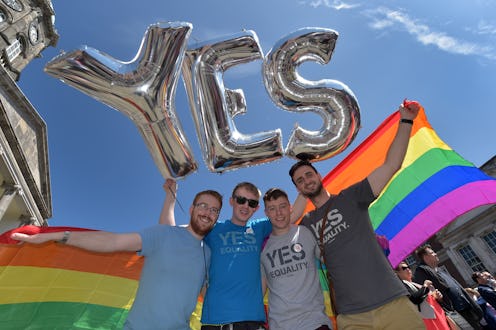News
Ireland Votes To Approve Gay Marriage
Irish voters headed to the polls in droves on Saturday, voting to approve a same-sex marriage referendum in one of the country's highest turnouts in decades. Over 3.2 million Irish citizens cast their ballots in favor of the measure, with thousands of ecstatic locals cramming into the courtyard of Dublin Castle to watch the results in real-time. Same-sex couples and swaths of LGBT activists expressed heavy emotions as the votes rolled in.
"A lot of my family have voted no in this campaign so at a personal level it has been very traumatic," 54-year-old administrator Jean Webster told Reuters on Saturday. Webster, who came out eight years ago after separating from her husband, told the news agency that it was the happiest day of her life after the births of her children. "I needed to wake up this morning to have thousands of people affirm my rights when certain people in my family weren't."
Health Minister Leo Varadkar, the country's first openly gay cabinet official, told The Irish Times that the campaign to approve the measure had become something of a "social revolution."
"I wanted to be an equal citizen in my own country and today I am," said Varadkar. "We're the first country in the world to enshrine marriage equality in our constitution and to do so by popular mandate, so it’s a very proud day I think for Irish people."
The new measure gives same-sex couples the same rights as heterosexual couples, and allows them identical legal familial protections under the law.
Those who voted "no" on the measure expressed disappointment on Saturday, but were largely unsurprised by the outcome. After congratulating those who voted "yes", Iona Institute Director David Quinn told RTÉ News that he was "quite philosophical" about the outcome.
"Obviously there's a certain amount of disappointment," said Quinn. He added that he would continue to "affirm the importance of biological ties and of motherhood and fatherhood", and that his Catholic advocacy group was "proud to have helped represent the many hundreds of thousands of Irish people who would otherwise have had no voice in this referendum because all of the political parties backed a Yes vote."
Varadkar told reporters on Saturday that he respected the votes of those who had cast a "no" ballot.
"I think they [had] genuine concerns about religious freedom in schools and about parentage," he said. "We need now to continue to re-assure them as legislation is brought through over the next number of years, that this is a vote about equality and not those other things."
Despite opposition from the Catholic Church, proponents of the same-sex marriage measure received support from various clergy, including Archbishop of Dublin Diarmuid Martin.
"I think really the Church needs to do a reality check [and] move into denial of the realities," said Martin in an interview with RTÉ News, indicating that church leaders needed to reconsider the way they connected with young people and social minority groups. "I ask, most of these young people who voted yes are products of our Catholic school system for 12 years ... there’s a big challenge there to see how we get across the message of the Church."
Saturday's historic vote officially made Ireland the first nation in the world to pass a same-sex marriage referendum by popular vote — and its residents couldn't be prouder.
"We woke up today to a new Ireland," Webster told Reuters. "The real Irish Republic that I have dreamed of my whole life."
